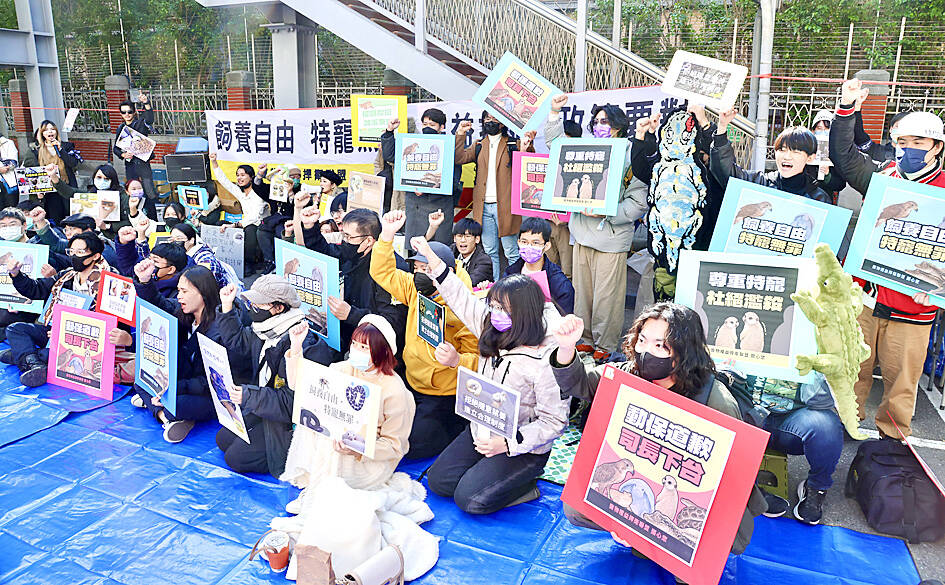Members of a pet ownership alliance and dozens of pet owners yesterday staged a sit-in outside the Legislative Yuan protesting the Ministry of Agriculture’s plan to ban the ownership or importation of 955 more wild animals.
The Department of Animal Welfare on Jan. 3 discussed adding 955 animals to the ministry’s List of Animals Banned from Being Owned, Imported or Exported.
Animals banned from import or ownership include 22 categories, such as the spectacled caiman (a crocodile-like reptile), all species in the Dasypodidae family (armadillos), Castor genus (beavers) and the Canidae family, except for domestic dogs, the department said.

Photo: CNA
Animals banned from ownership include eight categories, such as the Burmese python, raccoons, and all types of the Chelydridae family (snapping turtles), it said.
About 70 percent of the 955 animals on the list have already been banned from being imported since a revision to the Foreign Trade Act (貿易法) was enacted in 2023.
The protesters yesterday urged the ministry to reconsider the policy.
Ko Hsin-ping (柯心平), an animal expert and member of the alliance, said the list lacked scientific evidence and legal support, adding that many of the animals on the list have been sold in the domestic market for years.
Ko said he is concerned that the ban would create a black market for the animals, making government management more difficult, while having a negative impact on animal welfare.
As the alliance has a meeting with a legislator on Wednesday, the alliance would decide its next step after it sees the government’s response, he said.
Instead of banning animals, the government should promote reasonable regulations and provide clear guidelines, he added.
Department of Animal Welfare Director Chiang Wen-chuan (江文全) said the ban is being discussed because of the risk the animals pose to the nation’s ecology and public safety.
A pet classification management system is necessary to tighten control measures on high-risk animal species, he said.
The classification management system is still being discussed, and the department would take into consideration different opinions and make its decision based on scientific evidence, he said.
Animals on the list would not be euthanized, but there must be better management on the breeding, importation and selling of these animals, he said.
Whether a public hearing would be held is yet to be decided, he added.

The manufacture of the remaining 28 M1A2T Abrams tanks Taiwan purchased from the US has recently been completed, and they are expected to be delivered within the next one to two months, a source said yesterday. The Ministry of National Defense is arranging cargo ships to transport the tanks to Taiwan as soon as possible, said the source, who is familiar with the matter. The estimated arrival time ranges from late this month to early next month, the source said. The 28 Abrams tanks make up the third and final batch of a total of 108 tanks, valued at about NT$40.5 billion

Travel agencies in Taiwan are working to secure alternative flights for travelers bound for New Zealand for the Lunar New Year holiday, as Air New Zealand workers are set to strike next week. The airline said that it has confirmed that the planned industrial action by its international wide-body cabin crew would go ahead on Thursday and Friday next week. While the Auckland-based carrier pledged to take reasonable measures to mitigate the impact of the workers’ strike, an Air New Zealand flight arriving at Taipei from Auckland on Thursday and another flight departing from Taipei for Auckland on Saturday would have to

A group from the Taiwanese Designers in Australia association yesterday represented Taiwan at the Midsumma Pride March in Melbourne. The march, held in the St. Kilda suburb, is the city’s largest LGBTQIA+ parade and the flagship event of the annual Midsumma Festival. It attracted more than 45,000 spectators who supported the 400 groups and 10,000 marchers that participated this year, the association said. Taiwanese Designers said they organized a team to march for Taiwan this year, joining politicians, government agencies, professionals and community organizations in showing support for LGBTQIA+ people and diverse communities. As the first country in Asia to legalize same-sex

MOTIVES QUESTIONED The PLA considers Xi’s policies toward Taiwan to be driven by personal considerations rather than military assessment, the Epoch Times reports Chinese President Xi Jinping’s (習近平) latest purge of the Chinese People’s Liberation Army (PLA) leadership might have been prompted by the military’s opposition to plans of invading Taiwan, the Epoch Times said. The Chinese military opposes waging war against Taiwan by a large consensus, putting it at odds with Xi’s vision, the Falun Gong-affiliated daily said in a report on Thursday, citing anonymous sources with insight into the PLA’s inner workings. The opposition is not the opinion of a few generals, but a widely shared view among the PLA cadre, the Epoch Times cited them as saying. “Chinese forces know full well that